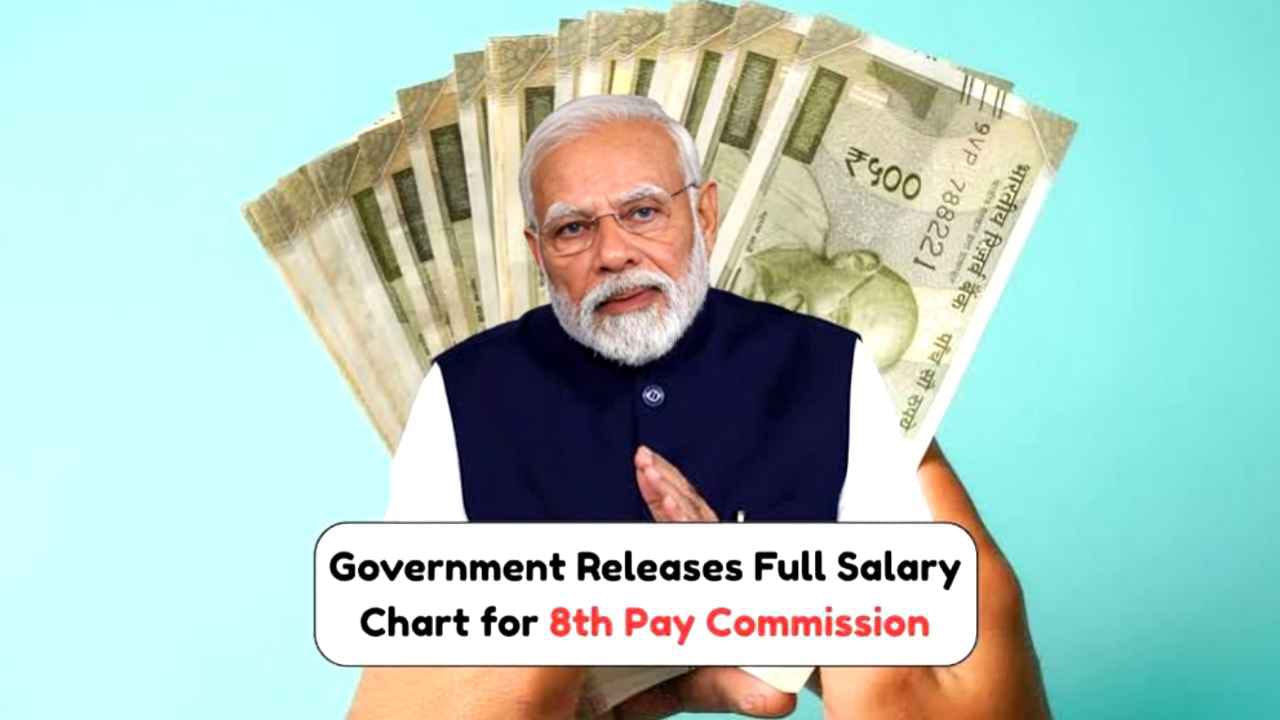Government Confirms Date for 8th Pay Commission – Full Salary Chart for Every Pay Level Officially Released
The Government of India has officially confirmed the starting date for the 8th Pay Commission, bringing good news to millions of central government employees and pensioners. According to the latest update, the 8th Pay Commission will come into effect in January 2026, with implementation work beginning in mid-2025. This move aims to revise the salaries, allowances, and pensions of employees to keep up with the rising cost of living.
A full salary chart has also been released, giving employees an early idea of what to expect from their revised pay structure based on their current pay levels.
This article will help you understand what the 8th Pay Commission is, when it starts, who it will benefit, and what kind of salary changes you can expect.
What is the 8th Pay Commission?
The Pay Commission is set up by the central government every few years to review and recommend changes to the salary structure, pension, and allowances of central government employees. The 7th Pay Commission came into effect in 2016. Now, with the gap of 10 years coming to an end, the government has confirmed the 8th Pay Commission rollout.
The 8th Pay Commission is expected to bring a major hike in salaries for employees from Level 1 to Level 18 across different departments and ministries.
When Will the 8th Pay Commission Start?
As per the official confirmation, the implementation will begin from January 2026, but preparations will start from July 2025. A committee will be formed to study inflation, cost of living, and current pay scales. Their final report will guide the exact hike and changes in allowances.
This timeline allows employees and pensioners to prepare for the shift, and also helps the government to smoothly manage the financial adjustments.
Who Will Benefit From the 8th Pay Commission?
The 8th Pay Commission will benefit:
-
Central Government Employees (Group A, B, and C)
-
Central Pensioners
-
Armed Forces Personnel
-
Railways and Postal Department Employees
-
Teachers and Professors in Central Institutions
-
Officers of Central Autonomous Bodies
State governments may also adopt the recommendations later for their own employees.
Highlights of the New Salary Structure
One of the biggest concerns for employees is the new salary amount after the revision. According to early reports, there could be a salary hike of 15% to 25% depending on the pay level and department.
Let’s look at the detailed breakdown.
Overview Table
| Pay Level | Current Basic Pay (7th CPC) | Expected Basic Pay (8th CPC) | Estimated Monthly Increase |
|---|---|---|---|
| Level 1 | ₹18,000 | ₹22,000 – ₹23,000 | ₹4,000 – ₹5,000 |
| Level 4 | ₹25,500 | ₹30,000 – ₹32,000 | ₹4,500 – ₹6,500 |
| Level 6 | ₹35,400 | ₹42,000 – ₹44,000 | ₹6,000 – ₹8,500 |
| Level 10 | ₹56,100 | ₹65,000 – ₹68,000 | ₹9,000 – ₹12,000 |
| Level 12 | ₹78,800 | ₹90,000 – ₹95,000 | ₹11,000 – ₹16,000 |
| Level 14 | ₹1,44,200 | ₹1,60,000 – ₹1,75,000 | ₹15,000 – ₹30,000 |
| Level 18 | ₹2,50,000 | ₹2,75,000 – ₹3,00,000 | ₹25,000 – ₹50,000 |
Other Key Benefits Under 8th Pay Commission
Besides salary hikes, the new pay commission will also revise several allowances and perks:
-
Dearness Allowance (DA) will be recalculated with a fresh formula
-
House Rent Allowance (HRA) may be increased by 2-3%
-
Medical and Travel Allowances will be improved to reflect modern costs
-
Pension revision for retirees with higher basic amount and fixed yearly increase
-
Improvement in pay matrix for promotional opportunities
These changes will offer better financial support to both current and retired government staff.
Pensioners to Benefit Equally
The government has clarified that pensioners will not be left behind. Their basic pension will also be revised based on the new pay matrix, and likely to include:
-
Higher monthly pension
-
Better DA and medical benefits
-
One-time arrears for delay in implementation
This move will be a great relief for elderly pensioners struggling with rising expenses.
Public Reaction and Expectations
The announcement has been welcomed by employee unions and worker associations. Many employees were expecting a long delay in the announcement, but the official confirmation has brought relief and optimism.
Experts believe that the 8th Pay Commission will not only help employees, but also boost the economy by increasing spending power and consumption.
Frequently Asked Questions (FAQs)
Q1: When will the 8th Pay Commission start?
The 8th Pay Commission will be implemented from January 2026, and work will begin from mid-2025.
Q2: Who will get benefits under the 8th Pay Commission?
Central government employees, pensioners, armed forces personnel, and employees of central autonomous bodies will benefit.
Q3: How much salary hike can employees expect?
The expected hike is 15% to 25%, depending on the current pay level.
Q4: Will pensioners get arrears too?
Yes, pensioners will receive a revised pension and may also get arrears if implementation is delayed.
Q5: Is the 8th Pay Commission applicable to state employees?
Not directly, but state governments may adopt the recommendations for their own staff later.
Final Words
The confirmation of the 8th Pay Commission is a positive step for millions of government workers and retirees across India. With better salaries, improved allowances, and stronger pension support, employees can expect better financial stability in the coming years.
The salary chart gives a fair idea of what each pay level can expect, and the detailed plan shows the government’s serious commitment to employee welfare. As we approach 2026, all eyes will be on the final report and official roll-out of this long-awaited reform.




